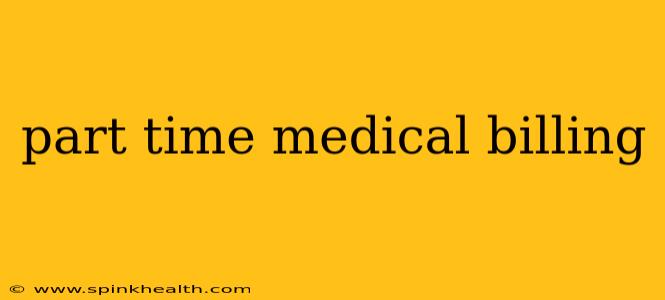The hum of the office fades, replaced by the quiet click of your keyboard at home. The kids are settled, the dinner dishes are done, and you're finally tackling that to-do list – which, tonight, includes medical billing. For many, the allure of part-time medical billing is undeniable: flexibility, the chance to utilize existing skills, and the potential for a fulfilling career path, all on your own terms. But what does it truly entail? Let's delve into the world of part-time medical billing and answer some key questions.
What are the Job Duties of a Part-Time Medical Biller?
A part-time medical biller’s responsibilities mirror those of a full-time biller, just scaled down to fit a flexible schedule. This typically involves:
- Submitting claims: Ensuring accurate and timely submission of medical claims to insurance providers. Think of it as being a skilled advocate for the medical practice, meticulously preparing each claim to maximize reimbursement.
- Following up on claims: Tracking claim statuses, identifying denials, and appealing those denials that require further action. This involves a keen eye for detail and a persistent approach to ensure payment.
- Processing payments: Recording payments received from insurance companies and patients, reconciling accounts, and managing outstanding balances. Accuracy is paramount here.
- Maintaining patient records: Keeping accurate and updated patient records, including insurance information and billing details. This often involves using specialized billing software.
- Coding and data entry: Translating medical diagnoses and procedures into standardized codes used by insurance companies. This requires a solid understanding of medical terminology and coding systems (like ICD-10 and CPT).
How Much Can You Earn Doing Part-Time Medical Billing?
The earning potential of a part-time medical biller is variable and depends on several factors, including:
- Experience: Experienced billers command higher hourly rates or salaries.
- Location: Geographical location significantly impacts pay rates. Cost of living in a particular area often dictates compensation.
- Employer: Large healthcare systems might offer slightly higher wages than smaller practices, but this can be offset by less flexibility.
- Hours worked: Your earnings directly correlate to the number of hours worked per week.
While exact figures are difficult to pinpoint, many part-time medical billers earn a respectable income that complements other sources of income or serves as their primary source of funds.
What Skills are Needed for Part-Time Medical Billing?
Success in part-time medical billing hinges on a combination of hard and soft skills. These include:
- Medical billing and coding knowledge: A strong understanding of medical terminology, ICD-10 and CPT coding, and insurance claims processing is crucial.
- Computer skills: Proficiency in using medical billing software and other relevant computer programs is essential.
- Data entry skills: Accuracy and speed in data entry are vital for efficient billing.
- Attention to detail: Meticulous attention to detail is paramount to avoid errors and ensure accurate claim submissions.
- Communication skills: Effective communication with insurance companies, patients, and medical office staff is key to resolving billing issues.
- Problem-solving skills: The ability to identify and resolve billing discrepancies and challenges is crucial.
Is Part-Time Medical Billing Right for Me?
This career path might be a great fit if you are:
- Detail-oriented: You thrive in environments that demand precision and accuracy.
- Tech-savvy: You are comfortable working with computers and software applications.
- Independent: You enjoy working independently and managing your own time effectively.
- Flexible: You're comfortable adjusting your schedule to meet changing demands.
- Patient: Medical billing involves persistent follow-up; patience is a virtue here.
Where Can I Find Part-Time Medical Billing Jobs?
Opportunities abound, from online job boards like Indeed and Monster to specialized healthcare recruitment agencies. Many smaller medical practices also actively seek part-time billers. Networking within the healthcare community can also open doors to unexpected opportunities.
The journey into part-time medical billing can be both challenging and rewarding. It allows individuals to pursue a meaningful career while enjoying the flexibility to balance work and personal life. With dedication, the right skills, and a proactive approach, a successful career in part-time medical billing is entirely within reach.

